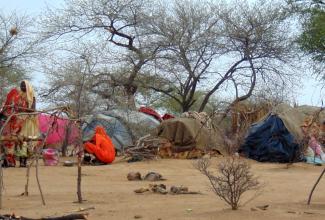Humanitarian emergencies
The forgotten war
 picture-alliance/AA/Abdoulaye Adoum Mahamat
picture-alliance/AA/Abdoulaye Adoum Mahamat
On 15 April 2023, fighting broke out between the Sudanese army (Sudanese Armed Forces – SAF) and a rival paramilitary group, the Rapid Support Forces (RSF), for control of the country. One year later, the war continues unabated.
Both warring parties have been targeting civilians. The army has bombed civilian targets and important infrastructure, while the RSF is accused of murder, rape and looting. Moreover, a food emergency is looming. The World Food Programme (WFP) warns that people are already dying of hunger.
According to the International Organization for Migration (IOM), 10.7 million people were forced to flee their homes by the beginning of the year. Most people are internally displaced persons. Chad is hosting the largest number of people who have fled the country.
The UN High Commissioner for Human Rights reports that almost half of the population – 25 million people – is in urgent need of food and medical aid. Around 80 % of hospitals have been shut down.
At least 14,600 people had been killed and 26,000 others injured by March, as reported by the UN. Actual figures could be much higher.
The onset of war
The collapse of order in Sudan in April 2023 has been a long time coming. In a Guardian article, Sudanese journalist Nesrine Malik traced the beginnings back to an uprising by ethnic minorities in Darfur 20 years ago. The then President Omar al-Bashir did not want to send his valuable army to fight for a region he anyway disregarded and instead chose the Arab militia Janjaweed to put down the rebellion. Gradually, the Janjaweed evolved into the paramilitary RSF.
In 2019, al-Bashir’s 30-year dictatorship ended, leading to an uneasy power-sharing agreement between the civilian population and the military. This agreement ended with the declaration of a state of emergency by the leader of the Sudanese army, General Abdel Fattah al-Burhan, in 2021. Al-Burhan seized power by allying himself with the RSF, whose leader General Mohamed Hamdan Dagalo, known as Hemedti, backstabbed al-Bashir and became deputy.
In the following year and a half, however, tensions between the two factions increased. The main points of contention were the integration of the RSF into the regular army and disagreements over plans for a political transition. When RSF members were eventually redeployed throughout the country, the army saw this as a threat, and violence erupted on the streets of Khartoum. From the capital, violence quickly spread across the country.
Current military landscape
At the beginning of the war, the RSF quickly gained control over large parts of Khartoum, with the exception of the military bases. They also took control of the cities al-Chartum Bahri and Omdurman as well as the western regions of Kordofan and Darfur. The army controlled most of the east and continued to direct its operations from the strategic centre Port Sudan.
In December, however, the RSF had advanced further east and captured Sudan’s second largest city, Wad Madani. In February, after months of setbacks, the army was able to recapture part of Omdurman, marking the first significant territorial gain since the beginning of the conflict. According to Middle East Eye, it has also made breakthroughs in Khartoum.
Several ceasefires have failed. The most recent attempt was a call by the UN Security Council for a ceasefire during Ramadan, which began in March. This appeal was welcomed by the RSF but rejected by the army. Yasser al-Atta, a senior general in the SAF, declared that there would be no ceasefire until the RSF left civilian sites.
Global dimensions
The conflict has global implications. Regional and international powers are interested in Sudan because it connects the Middle East and Africa and is rich in mineral resources.
Russia’s mercenary group Wagner supports the RSF. The presence of Wagner possibly explains Ukraine’s involvement in Sudan. According to the Kyiv Post, Ukraine’s main English-language newspaper, Ukrainian special forces are supporting the Sudanese army against the Russian Wagner mercenaries.
According to a Bloomberg report, Iran has supplied the Sudanese army with combat drones. Egypt and Saudi Arabia are also supporting the Sudanese army. The United Arab Emirates, on the other hand, which buys most of western Sudan’s gold reserves, has supplied weapons to the RSF.
The United States had already been pushing for a civilian transition before the war. Now, together with Saudi Arabia, it has made several unsuccessful attempts to mediate between the warring parties. In December last year, the US formally determined that both parties had committed war crimes and that the RSF and allied militias had also committed crimes against humanity. Among other things, the Arab-led RSF is accused of carrying out an ethnic massacre against the Masalit in West Darfur.
One concern that the UN repeatedly emphasises is that the conflict could spread beyond Sudan’s borders and threaten peace in the entire region.
Humanitarian situation
The situation in Sudan is catastrophic, but it is competing for international attention with the wars in Gaza and Ukraine. According to the United Nations, current funding for humanitarian aid is woefully insufficient.
According to the UN Children’s Fund (UNICEF), 14 million children are in urgent need of life-saving aid. Many of them have no access to medical care, especially those who live in remote areas.
The country is well on the way to developing the world’s worst hunger crisis. According to the WFP, almost 18 million people are affected by acute hunger. Moreover, nine out of ten of these people are stranded in areas that are largely inaccessible to humanitarian aid workers. In South Sudan, where 600,000 people have sought refuge, one in five children in the border transit centres is suffering from malnutrition, as the WFP reports.
The refugee camps are struggling to keep up with the pace of the new arrivals. In Adré, a Chadian border town near the state of West Darfur, the number of Sudanese refugees more than doubles the number of locals. With a local population of 68,000 people, Adré currently accommodates 150,000 refugees and barely has enough food and clean water for all of them. Aid organisations point out that more shelters, medicine and basic supplies are urgently needed. The WFP has announced that funding for food aid for Sudanese refugees in Chad could run out next month.
The already nightmarish situation in Sudan threatens to become even more catastrophic, but international attention is lacking.
Roli Mahajan is a journalist based in Lucknow, India.
roli.mahajan@gmail.com



